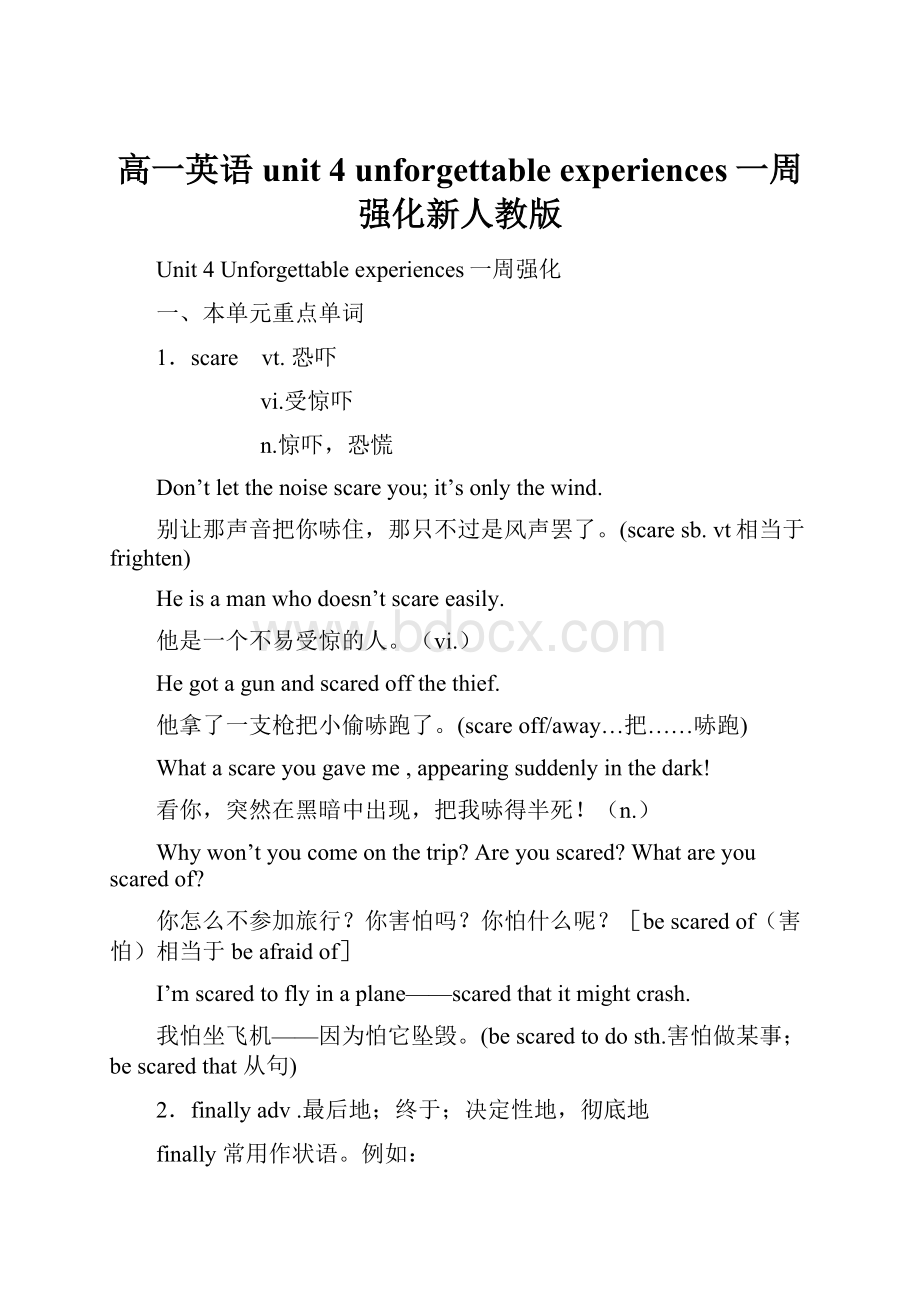高一英语unit 4 unforgettable experiences一周强化新人教版.docx
《高一英语unit 4 unforgettable experiences一周强化新人教版.docx》由会员分享,可在线阅读,更多相关《高一英语unit 4 unforgettable experiences一周强化新人教版.docx(16页珍藏版)》请在冰豆网上搜索。

高一英语unit4unforgettableexperiences一周强化新人教版
Unit4Unforgettableexperiences一周强化
一、本单元重点单词
1.scare vt.恐吓
vi.受惊吓
n.惊吓,恐慌
Don’tletthenoisescareyou;it’sonlythewind.
别让那声音把你哧住,那只不过是风声罢了。
(scaresb.vt相当于frighten)
Heisamanwhodoesn’tscareeasily.
他是一个不易受惊的人。
(vi.)
Hegotagunandscaredoffthethief.
他拿了一支枪把小偷哧跑了。
(scareoff/away…把……哧跑)
Whatascareyougaveme,appearingsuddenlyinthedark!
看你,突然在黑暗中出现,把我哧得半死!
(n.)
Whywon’tyoucomeonthetrip?
Areyouscared?
Whatareyouscaredof?
你怎么不参加旅行?
你害怕吗?
你怕什么呢?
[bescaredof(害怕)相当于beafraidof]
I’mscaredtoflyinaplane——scaredthatitmightcrash.
我怕坐飞机——因为怕它坠毁。
(bescaredtodosth.害怕做某事;bescaredthat从句)
2.finallyadv.最后地;终于;决定性地,彻底地
finally常用作状语。
例如:
Thespeakerfinallymanagedtogettheattentionofhisaudience.
讲话人终于设法吸引住了观众。
(终于)
Theytalkedaboutitforhours.Finally,theydecidednottogo.
他们谈论了几个小时,最后决定不去。
(最后)
It’snotfinallysettledyet.
那事尚未决定性地解决。
(决定性地)
注意:
①finally可用来表示顺序,引出列举各项的最后一项。
此时,不可用atlast与intheend替换。
②不可用作感叹语。
例如:
Atlast!
Wherethehellhaveyoubeen?
总算找着你了!
你到底上哪儿去了?
(不可用作finally)
3.advance
(1)v. 前进;进展(moveforwardordevelop)例如:
Thesoldiersadvancedontheenemy.
士兵们向敌人进发。
Amonthhaspassedandtheworkhasnoadvanced.
一个月过去了,可是工作却没有进展。
(2)n.前进;进展(forwardmovementordevelopment)例如:
Youcannotstoptheadvanceofoldage.
你不能阻止年龄老化的步伐。
相关短语:
inadvance 提前
inadvanceof 在……前面;比……进步;超过
拓展:
(1)advancedadj. 高级的;先进的
如:
advancededucation 高等教育
advancedEnglish 高级英语
advanceworker 先进工人
(2)advancementn.前进,进展
4.seizevt.抓住;逮住;夺取
Theweaponsfoundinthehousewereseizedbythepolice.
在这所房子发现的武器被警察没收了。
(依法没收,扣押,查封)
Theenemyarmyseizedthecitysoon.
敌军不久就攻占了这座城堡。
(强占)
Heseizedmyhands,shookit,andsaidhowgladhewastoseeme.
他紧握着我的手,摇了几下,并且说他真高兴见到我。
(抓紧,握紧;takeholdof)
Hewasseizedwithsuddenchestpains.
他胸部突然作痛。
(常用被动,侵袭attack)
注意:
seize后常接by短语,后接表示抓的具体部位。
例如:
Heseizedmebythehand.
他抓住我的手。
(seizesb.+by+the+部位,the不可改为one’s或被省略掉)
相当于:
Heseizedmyhand.
5.strugglevi.努力;挣扎;奋斗
n.竞争;努力;奋斗
Hestruggledtothesurfaceasthewaterdraggedhimdown.
水把他往下卷,他奋力挣扎到水面上来。
(挣扎)
Theystruggledagainstpoverty.
他们与贫困搏斗。
(struggleagainst与……搏斗/作斗争)
Theystruggledfornationalindependence.
他们为民族独立而斗争。
(strugglefor为……而奋斗/斗争)
Weshouldstruggletoovercomeourshortcomings.
我们应该努力克服自己的缺点。
(struggletodosth.)
Aforeignlanguageisaweaponinthestruggleoflife.
外国语是人生斗争的一种武器。
(n.)
相关词组:
struggletoone’sfeet 挣扎着站起来
拓展:
struggle可与不同的介词连用,构成不同的词组。
例如:
Theystruggledthroughthesnowstorm.
他们冒着暴风雪前进。
(strugglethrough)
Thesickbabycriedandstruggledinitsmother’sarms.
病孩哭闹着,在母亲怀里挣扎着。
(strugglein…)
Thelamplightstruggledoutthroughthefog.
灯光勉强透过迷雾照过来。
(struggleoutthrough…)
派生词:
struggling adj. 奋斗的
6.flow vi.&n.流动
Thestreamflowedalongrapidly.
溪水畅流。
Bloodwasflowingfromhiswound.
血从他的伤口流出。
Thecarsflowedinasteadystreamalongthemainroad.
汽车在干道上不停的驶过。
Astheladiesdranktheirtea,conversationbegantoflow.
女士们在喝茶,话题也滔滔不绝起来。
That’sarichcity;moneyflowslikewaterthere.
那是一个富裕的城市,金钱有如流水,到处都是。
(充满)
Herthickwavyhairflowedoverhershoulders.
她浓密的波浪式头发垂在肩上。
[(头发,布)飘拂]
TheflowoftheRiverNileisatitsfastestinthelatesummer.
在夏季末,尼罗河的流速最快。
(n.流速)
注意:
flow是一个规则动词,它的过去式、过去分词分别为:
flowed;flowed.
而fly(v.)的过去式、过去分词则分别为:
flew,flown,不可混淆。
即:
flow—flowed—flowed—flowing(现在分词)
fly—flew—flown—flying(现在分词)
7.strikevt.&vi.(struck,struck/stricken)击打;打动
n.击打;打动
用法:
strike用法较多,主要掌握以下用法:
Hewassoangrythathestruckhimonthenose.
他是那么的生气,以至打了他的鼻子。
(strucksb.onthe+身体部位,打在某人某个部位)
Theywerestrucksilent.
他们愣住了。
(突然/意外的成为)
Abulletstruckhimdead.
一颗子弹把他击毙了。
(击中)
Istruckamatchandheldittohiscigarette.
我擦了根火柴递过去给他点烟。
(strikeamatch擦火柴)
Theclockisstrikingfour.
钟在敲四点。
[(钟)敲响报(时)]
Hewasstruck(down)byillness.
他病倒了。
[(疾病)侵袭,harmsuddenly]
Myfriendwasstruckbyasnake.
我的朋友被蛇咬伤了。
(咬伤,抓伤)
WhatstruckmemostwasthebeautyoftheWestLake.
给我印象最深的是西湖的美景。
(给……以印象;打动,感动)
Itstruckmethatweoughttomakeanewplan.
我突然想到我们应当重新作出安排。
(突然想起,comesuddenlytothemindofsth.
strikesb.某人突然想起某事)
Theworkersstruckforimprovingtheworkingconditions.(罢工)
工人们为了改善工作环境而举行罢工。
相当于:
Theworkerswentonstrikeforimprovingtheworkingconditions.
注意:
goonstrike进行罢工(指动作)
beonstrike在罢工(指状态)
比较:
beat,hit,strike和knock
(1)beat指用力地打,痛打,跳动,还可以表示“打败”,如:
Thelandlordbeatthefarmhandheavily.地主毒打长工。
TheIraqarmywasbeaten.伊拉克军队被打败了。
(2)hit打击,袭击,打中,如:
Anearthquakehitthedistrict.这地区受到地震的袭击。
Oneofthestoneshitthewindow.有一块石头打中了窗户。
(3)strike通常指一下一下地打或敲击,留下印记等,如:
Strikewhiletheironishot.趁热打铁。
Theclockisstriking12.钟在敲12点。
(4)knock指敲打并伴有响声。
它还有“打倒、打翻”的意思,如:
Someoneisknockingatthedoor.有人敲门。
Heknockedthegirldown.他把这女孩撞倒了。
8.destroyvt.毁环;破环(putanendtotheexistenceofsth.)
Theenemydestroyedthecity.
敌人毁了城市。
Youhavedestroyedmylifeandallmyhope.
你毁了我的一生和我的一切希望。
Thedogismadandoughttobedestroyed.
这只狗疯了,应该杀掉。
比较:
destroy/damage
damage意为“损害,损失”(causeloss/harmto),只表示对某物有所损害或损失,但某物仍旧存在。
destroy意为“毁坏,破坏”,用来指完全地摧毁了某物,而某物也不存在了。
例如:
Doawaywiththebadhabitsthatmightdamageyourhealth.
去掉那些有可能损害你健康的坏习惯。
(causedamageto,n.)
9.fearn.[C&U]害怕;恐惧;担忧
(1)haveagreatfearof对……很害怕
Ihaveagreatfearofsnakes.我非常害怕蛇。
(2)infearof害怕;担心
I'mlivingin(daily)fearofdismissal(解雇).
(3)forfearof/that以防;以免
Sheaskedusnottobenoisy,forfearofwakingthesleepingbaby(=fortearthatwemightwakethesleepingbaby).
她叫我们别吵闹,以免吵醒了睡着的孩子。
10.touch vt.&vi 触摸;(使)接触;感动
n.接触,联系
Don’ttouchthatpaint;it’swet.
油漆未干,请勿接触。
(接触)
Themattertouchesyourinterests.
这事关系你的利益。
(关系,涉及)
Thestorytouchedallofus.
这个故事使我们都很感动。
(相当于:
Allofusweregreatlytouchedbythestory.)
Thepaintingwerenottouchedbythefire.
画未被火所毁。
(destroyed/damaged)
Noonecantouchhiminmathematics.
数学方面无人能比得上他。
(匹敌,赶得上)
Ifeltatouchonmyarm.
我觉得臂上有人摸了一下。
(n.[C]触摸)
Theblindhaveakeentouch.
盲人有敏锐的触觉。
(n.[C]触摸)
Theballisoutoftouch.
球已出边线区。
(outoftouch在……区域之外)
Theycanreadbytouch.
他们通过手摸来阅读。
(bytouch)
相关词组:
beintouchwith与……有联系(指状态),例如:
Heiswellintouchwiththesecrets.
他熟知这些秘密。
[be(well)touchwithsth.]
AreyouintouchwithSmithnowadays?
目前你和史密斯有接触吗?
(beintouchwithsb.)
keepintouchwith 与……保持联系(指状态),例如:
Ihavekeptintouchwithhimsinceweseparated.
自从我们分手以来,我一直与他保持联系。
getin/intotouchwith 与……取得联系
Ifyouwantmuchmoreinformation,getintouchwiththemintime.
如果你想得到更多的信息请与他们及时联系。
beoutoftouchwith 与……失去联系
Wehavebeenoutoftouchwiththemforabouttwoyears.
我们大约两年没有和他们联系了。
losetouchwith与……失去联系
Writeassoonasyoucan.Idon’twanttolosetouchwithyou.
尽可能常给我写信,我不希望和你失去联系。
辨析:
touch/feel
touch指“触摸”的短暂动作。
主语可以是有生命的,也可以是无生命的。
如:
Themountainsseemtotouchtheclouds.
群山似乎触及云霄。
feel则强调“抚摸,摸索”的过程,常与for/after连用。
如:
Hefeltalongthewallforthedoor.
他沿着墙摸索门。
(feel…for…摸索某物)
另外,feel还可用作系动词,后接形容词作表语,touch则不行。
例如:
Hefeelsthesilkanditfeelssoft.
他抚摸着丝绸,丝绸摸起来很柔软。
(vt.抚摸;linkv.)
不可写为:
…,anditisfeltsoft.
二、重点短语
1.takeplace发生,产生
用法:
同happen相近,但侧重点不一样。
takeplace通常指偶然发生或者经过计划安排而产生或者发生的事情。
happen则常指偶然性地发生的事情。
例如:
Whendidtheexplosionhappen/takeplace?
爆炸是在何时发生的?
(偶然发生)
Whenwillthesportsmeetingtakeplace?
运动会将在何时举行?
(经过计划安排而发生)
英语中,表示“发生”的单词或词组,如:
happen,takeplace,breakout,comeabout,它们有一个共同的特点,即都没有被动语态和宾语,只作为不及物动词使用。
例如下面句子为错句:
Chinahastakenplacegreatchangesinrecent20years.(×)
中国在近20年发生了很大的变化。
或者:
GreatchangeshavebeentakenplaceinChinainrecent20years.(×)
应说:
GreatchangeshavetakenplaceinChina.(√)
比较:
takeplace/taketheplaceof/takeone’splace
taketheplaceof表示“代替,接替某人的职务或工作等”,也可写为:
takeone’splace。
例如:
Plasticshavetakentheplaceofmanymaterials.
塑料已经取代了许多材料。
(taketheplaceofsth.)
CanyoutaketheplaceofMr.Wangtoday?
Heissick.(taketheplaceofsb.)
今天你能顶替王先生吗?
他病了。
此句也可写为:
CanyoutakeMr.Wang’splacetoday?
Heissick.(takesb’splace)
又如:
Prof.Whiteisawayonbusiness.SoIamtakinghisplace.(takeone’splace)
怀特教授因事外出,我现在代替他的职务。
(相当于:
……SoIamtakingtheplaceofhim)
takeone’splace除了上述讲的可以替换taketheplaceof外,还有以下用法:
①“就席,到某人应去的位置上”,其中one’s与句中的主语指同一个人。
例如:
Now,everybodytakeshisplace.Theshowwillbegininaminute.
好了,大家各就各位,演出马上就要开始了。
Takeyourplacesforthenextdance.
就位,准备下一个舞蹈。
②认为,当然
Thenewworkwilltakeitsplaceamongthemostimportantpaintingofthiscentury.
这新作品会被认为是本世纪最重要的作品之一。
(beconsideredasbeing)
2.onfire失火
用法:
onfire一般用来指状态。
例如:
Thekitchenisonfirenow.厨房着火了。
(beonfire)
辨析:
catchfire/setfireto/set…onfire/underfire
catchfire“着火”,常指物体碰上火而燃起来,表示动作。
例如:
Thelittlegirlwasbadlyburnedwhenherdresscaughtfire.
小女孩的衣服着了火,被严重烧伤了。
setfiretosb./sth.“放火烧,点着了……”,常指蓄意放火。
例如:
Thepolicehasn’tfoundoutwhosetfiretothestorehouse.(setfiretosth.)
警方还没查出是谁放火烧了仓库。
set…onfire“某人点了火”,“纵火,放火,”相当于set…fireto…。
例如:
Whosetthehouseonfire?
是谁放火烧毁这房子的?
Jim’saniceboybuthe’llneversettheThamesonfire.
吉姆是个好男孩但他永不会做惊天动地的事。
(settheThamesonfire做惊人的事)
underfire “受人抨击;遭到炮火攻击”。
例如:
Somebuildingsareunderfirelastnight.
一些建筑物昨天晚上遭到炮火袭击。
相关词组:
makeafire 生火
gothroughfireandwater 赴汤蹈火;冒一切危险
playwithfire 冒险,做危险的事
3.gothrough
(1)遭受,受苦,经历(tosuffer/experience)
Thecountryhasgone/beenthroughtoomanywars.
这个国家遭受了太多的战争。
(2)通过(topassthrough/beacceptedby)
ThenewlawhasgonethroughParliament.
议会已经通过这项新法案了。
Theplanmustgothroughseveralstages.
这次计划必须经过几个阶段。
(3)举行(仪式)
Theywentthroughthenewmarriageservice.
他们举行了新婚仪式。
(4)使(某人)成功;(考试)及格;熬过(相当于getthrough)
Canyougothroughthisexamination?
你能通过这次考试吗?
(5)用完,耗尽
Theyhavegonethroughallthemoney.
他们已经用光了所有的钱。
(6)仔细检查;全面考虑(研究);搜查
Youshouldg